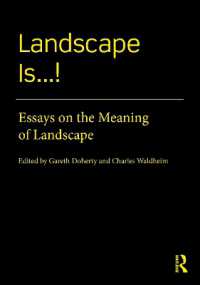- ホーム
- > 洋書
- > 英文書
- > Science / Mathematics
Full Description
Protein is one of the most important ingredients of the human diet and is considered crucial for the growth development of all age groups. Studies have set the recommended dietary allowance of protein as 0.8 g/kg body weight per day for healthy adults. The world population is projected to reach 10 billion by 2050 and it will be a significant challenge for the scientific community to overcome the growing demand for protein. The results of global warming, from shifting climactic conditions to unpredictable rainfalls, have further complicated the situation. The search for alternative protein sources that can be both sustainable and renewable is one of the major challenges in the face of potential mass protein malnutrition.
Oilseed crops such as soybean, mustard, oil palm, peanuts, cottonseed, flax seed, coconut, canola and sesame are mainly cultivated for the extraction of cooking oil and are underutilized as sources of protein. Oilseed meals contain as much as 50% protein but remain under-valued since they are traditionally utilized as fertilizer or as feed for livestock animals. Numerous recent studies show that oilseed meal sources can be utilized as a sustainable and renewable source of protein and could play a major role in alleviating the global problem of protein malnutrition.
Oilseed Meal as Sustainable Contributor to Plant-Based Protein explores oilseed crops that can contribute towards the regular supply of protein in an increasing population and changing climate. Each chapter focuses on a specific oilseed crop including comprehensive coverage of the processing and extraction specifics for each crop plus their amino acid profiles and other functional properties. The application of oilseed proteins for production of bioactive peptides and preparation of value-added products is also covered. This text is useful for food scientists and researchers seeking an updated single source for coverage on all the most important oilseed crops andtheir potential roles in combating protein shortages in a growing world population.
Contents
Oilseed meal as a source of protein: Introductory remarks.- Soybean meal: A feedstockwith gold standard protein.- Groundnut meal: Scientific interventions for achieving superior quality of protein.- Mustard meal: Marching towards producing a food grade protein.- Enriching canola meal to alternative source of protein.- Deoiled sesame seed cake and its utilization for production of protein.- Cottonseed meal: Eliminating gossypol for securing another source of protein.- Flax seed meal: A newer candidate of plant-based protein.- Scientific interventions for improving the utilization of palm kernel meal.- Value addition of sunflower seed mealto overcome protein needs.- Safflower seed meal: Progress towards obataining new protein.- Oliagenous brans (Rice and barley brans) as sustainable alternative of protein








